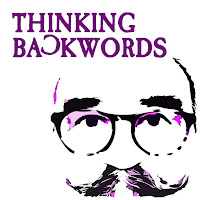Welcome to Thinking Backwords.
I'm your host, Clark H Smith.
We're diving into the distant ancestors of modern words.
On side A of this episode, we'll Think Backwords about words like ambassador and ambulance. Then we'll Flip over to side B and think about the *ultimate* family of words.
Joni Mitchell is the songbird of my youth. And now, as I've grown beyond childhood into an adult, her songs still whisper words of joy. Joni sang that growth to adulthood helped her see Both Sides Now of love and life. Seeing Both sides, that's an important perspective.
The idea of both (or all) sides is deeply rooted in language. The ancient root word -ambhi- means "from both sides" or even "around". What do you call an animal, say a frog, that can live in both water and on land? Amphibios (amphi = both + bios = life habitats). What do you call a government official who discusses national interests with the other side? Ambassador.
Now, here's the fun part of words. Sometimes words wind up with almost the opposite of their original meaning. What does "ambivalent" mean to you?
Let's test the meaning. I want to buy you lunch. Do you want
barbeque or pizza?
If you don't have a preference, and if you like to use big
words, you would say you were ambivalent. In that sense, ambivalent means
apathetic – no feeling for one option or the other.
But, that is the opposite of what ambivalent actually means!
We've got ambi – meaning both sides and the root word of "valiant"
meaning strong. Ambivalent actually means strong for both sides. So If I offer
you barbeque or pizza, and you are truly ambivalent, you yell, Absolutely, Yes!
I'll have both!!
Now that we've had a robust lunch, let's walk off some of
those calories
The ancient root word for walk is -el or sometimes heard as
-ul.
Let's take amb- (both or around) and add -ul… we get ambulate, to walk around. Perambulate is a word built from per = through, amb = both, and ul = walk). It means simply to walk around on all sides – to go anywhere. When the Brits take their baby out for a walk around the park, they don't use a stroller, they put baby in a pram – a great big contraction of perambulate.
It's kind of funny, to me, that the ambhi word family has more than one word like ambivalent – a word that has flipped sides to mean the opposite.
Let's say that excessive lunch just isn't sitting well with you. Not well at all!
You're beginning to think that you need medical attention at
a hospital. But what if you can't make it to the hospital? What do you do? You
call 911 to summon the hospital to come to you, but you don't want them to
walk, do you??
Nowadays, we have fantastic motorized hospitals, painted brightly with fast motors, bright lights, and loud sirens. But indeed, before automobiles, the hospital just came walking to you. The French called it the hôspital ambulant - the walking hospital. Especially during war, the medics would walk (or run!) out to the injured in the field.
Now isn't that just the way language works? Hospital is clearly the important part of the phrase hôspital ambulant. But when we shorten phrases, we often drop the important part and keep the details.
Now to Side B.
Decades ago, a radio host asked a housemaid how many people she tended to in the home. "Well, let's see, there are four boys, three girls, one adult, and one adultress."
This simple statement riveted my attention for years. What
is the difference between an adult and adulterer".Why is it so desirable
to be one and not the other?
Adult - Let's start with the common prefix ad- meaning "to". The root word, -ult, does that ring a bell? Ult is an ancient root word that means "beyond". You see it in words like "ultimate", "ulterior", and even "alter" and "alternate". Adult literally means "to beyond" or more fully it describes a person who has lived to an age beyond childhood.
But what about "adulter"? Instead of going beyond childhood, adultery means going beyond a relationship. An adulterer is someone who has gone to (someone else) beyond (the marriage partner). So there we have here identical word parts with dramatically different meanings.
BONUS WORD:
Hidalgo is a given-name in Spanish cultures. Hidalgo - the
'hid' part is a form of the ancient word that is related to "fillial"
and "affiliate" with a core meaning of "family".
Hid, in this case, means son.
Hid—al—go.
The 'al' part of the word derives from that root meaning of "beyond". The 'al' in Hidalgo word implies "beyond you and me". Hidalgo literally means "the son who is beyond... not simply my son, not simply your son, but is the son of all of us."
We have a term "favorite son" that has this same idea, Iif a popular or accomplished person is from our home town, we can all claim ownership… parenthood of them. We've lost the meaning of Hidalgo, but it is a beautiful idea, don't you think?


No comments:
Post a Comment